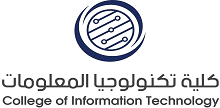The Cybersecurity Program is one of the College of Information Technology programs at Amman Arab University. One of the latest trends in information technology depends on the rapid development of digital infrastructures, such as computers, servers, networks, information systems, and others. It needs to be crystallized on the safety of networks, information, and people to adopt a more comprehensive concept of digital security, later called cyber security or cyberspace security.
Cyber security is all the technical, organizational, and administrative means used to prevent the exploitation and unauthorized use of systems, devices, and equipment by others. It helps to ensure the continuity of the operation of information and applications and systems, enhance the protection, confidentiality, and privacy of personal data, and take all necessary measures to protect people and users from any risks when using any of the components of cyberspace.
The cybersecurity program is one of the programs that will change the pattern of data protection for companies and businesses. It was developed for its unique advantage and the lack of specialists in meeting the needs of the local and regional technological market. Thus, qualified student competencies in the field of cybersecurity will be prepared to meet the needs of the labor market locally and regionally, capable of completing distinguished scientific and practical projects in a way that contributes to developing technical infrastructure, strengthening the knowledge economy, and developing Improving performance in local community institutions.
With the explosion of the information revolution and the advent of the digital age, especially in the 21st century, and its many repercussions due to the emergence of cyber threats and crimes, it has become a significant challenge for national as well as international security to the extent that many researchers considered cyberspace as the fifth field in wars after land, sea, air, and space. This necessitated the need for security guarantees within this digital environment, which crystallized mainly in the emergence of cyber security as a new dimension within the field of security studies. It has gained the interest of many researchers in this field.
Graduates of the Cybersecurity program can work locally and globally in several fields, the most important of which are:
• Analyst, engineer, and security systems executive.
• Intrusive Security and Malware Analyzer.
• Network security engineer and security observer.
• Smart security software developer.
• System, network, and web penetration lab.
In light of the preceding, the Bachelor’s Program in Cyber Security is an urgent national need to supplement the national and regional labor market and learn about the latest information and communication technology developments in protecting wireless networks and preventing their penetration.
Dr. Manar Mizher
Acting Head of Department
About the Bachelor of Cybersecurity
Cybersecurity aims to provide students with theoretical and applied skills in the field of protecting systems and information from unauthorized access by preserving confidentiality and protecting various devices and networks from piracy and breaches and detecting them before their occurrences, exploring weaknesses of systems and networks and addressing them. In addition, Cybersecurity aims to use and develop various tools related to encryption and management of information security protocols to provide a safe working environment for information.
Vision:
Excellence in teaching, learning, scientific research, and community service in the information technology field, locally and regionally.
Mission:
Preparing qualified student competencies in the information technology field, having the applied and research knowledge and the skills to meet the requirements of the labor market and local community institutions according to quality criteria locally and internationally.
Cybersecurity Major Bachelor's Program
Program Mission:
Preparing qualified students in the cybersecurity field to meet local and international standards and community requirements according to eLearning criteria.
Educational Program Objectives:
- Acquiring theoretical and practical skills and knowledge in the cybersecurity field.
- Providing professional competencies and practicing their profession with confidence and the ability to compete locally and regionally.
- Continuing to learn and promote professionally amid technical changes.
- Qualifying students to work effectively within teamwork, assume ethical and professional responsibilities, and realize the needs of society.
Educational Program Outcomes:
Graduates of the program will have the ability to:
- Analyze computing issues, apply principles of computer science and related fields, and find appropriate solutions
(Knowledge): Defining principles of computing and other related disciplines to identify solutions.
(Skill): Analyze computing problems to identify solutions. - (Skill): Design, implement, and evaluate a computing-based solution to meet a specific set of computing requirements within the context of the program specialty.
- (Skill): Communicate effectively in a variety of professional contexts.
- Discern professional responsibilities and make appropriate judgments about computing-based practices in accordance with ethical and legal principles.
(Knowledge): Recognition of professional responsibilities, ethical theories, legal and social issues.
(Skill): Employing cybersecurity computing practices based on legal and ethical principles. - Work and participate effectively as a member or team leader in activities related to the specialty.
(Competency): Work effectively as a team member or team leader participating in activities appropriate to the program specialty. - Apply security principles and practices to maintain operations in the presence of risks and threats. [CY]
(Knowledge): Illustrate security principles and practices to maintain operations in the presence of risks and threats.
(Skill): Assessing the severity of security risks, threats or digital crimes to ensure continuity of operations.
(Competency): Building security knowledge and skills to maintain operations in the presence of risks and threats.
Program Educational Objectives (PEOs):
- Acquiring theoretical and practical skills and knowledge in the cybersecurity field.
- Providing professional competencies and practicing their profession with confidence and the ability to compete locally and regionally.
- Continuing to learn and promote professionally amid technical changes.
- Qualifying students to work effectively within teamwork, assume ethical and professional responsibilities, and realize the needs of society.
Students Outcomes (SOs):
- Analyze computing issues, apply principles of computer science and related fields, and find appropriate solutions
(Knowledge): Defining principles of computing and other related disciplines to identify solutions.
(Skill): Analyze computing problems to identify solutions. - (Skill): Design, implement, and evaluate a computing-based solution to meet a specific set of computing requirements within the context of the program specialty.
- (Skill): Communicate effectively in a variety of professional contexts.
- Discern professional responsibilities and make appropriate judgments about computing-based practices in accordance with ethical and legal principles.
(Knowledge): Recognition of professional responsibilities, ethical theories, legal and social issues.
(Skill): Employing cybersecurity computing practices based on legal and ethical principles. - Work and participate effectively as a member or team leader in activities related to the specialty.
(Competency): Work effectively as a team member or team leader participating in activities appropriate to the program specialty. - Apply security principles and practices to maintain operations in the presence of risks and threats. [CY]
(Knowledge): Illustrate security principles and practices to maintain operations in the presence of risks and threats.
(Skill): Assessing the severity of security risks, threats or digital crimes to ensure continuity of operations.
(Competency): Building security knowledge and skills to maintain operations in the presence of risks and threats.
Mapping between PEOs and SOs:
| PEOs | SOs |
| PEO1 | 1,2 |
| PEO2 | 3,6 |
| PEO3 | 3,4 |
| PEO4 | 4,5 |






| Major | Credit Hours | Study Plan |
| Bachelor of Cybersecurity | 132 |
| Number | List of Research Papers | Abstract |
1 | Al-Aghbari, Anas , Abu-ulbeh, Waheeb , Ibrahim, Othman, and Saeed, Faisal (2015), The Readiness and Limitations of E-Government in Yemen, Jurnal Teknologi. | Download |
| 2 | Elyazgi, Moamar , Ibrahim, Othman , Abu-Ulbeh, Waheeb , and others, (2015), Investigating a Theoretical Framework for E-book Technology Acceptance, Journal of Soft Computing and Decision Support Systems. | Download |
| 3 | Alieyan, Kamal , ALmomani, Ammar , Manasrah, Ahmad , Kadhum, Mohammed M., (2015), A survey of botnet detection based on DNS, Neural Computing and Applications. | Download |
| Number | List of Research Papers | Abstract |
1 | Abumalloh, Rabab Ali , Al-Sarhan, Hassan Maudi , and Abu-Ulbeh, Waheeb (2016), Building Arabic Corpus Applied to Part-of-Speech Tagging, Indian Journal of Science and Technology. | Download |
| 2 | Abumalloh, Rabab Ali , Al-Sarhan, Hassan Maudi, Bin Ibrahim, Othman , Abu-Ulbeh, Waheeb, (2016), Arabic Part-of-Speech Tagging, Journal of Soft Computing and Decision Support Systems. | Download |
| 3 | Alieyan, Kamal , Kadhum, Mohammed M., and others, (2016), An overview of DDoS attacks based on DNS, International Conference on Information and Communication Technology Convergence (ICTC) (IEEE). | Download |
| 4 | Haj Aliwi, Hadeel Saleh , Alajmi, Putra Sumari, KA, Nasser , Alieyan, Kamal, (2016), The effect of packet loss in the homogeneous and heterogeneous protocols media exchange environment: A comparison, International Conference on Information and Communication Technology Convergence (ICTC) (IEEE). | Download |
| Number | List of Research Papers | Abstract |
1 | Alajmi, Nasser K. A. , Aliwi, H. S. H., Alieyan, Kamal, (2017), An Analytical Model for the Behavior of SIP, RSW, and H. 323 Messages and Session Time, WSEAS TRANSACTIONS on COMMUNICATIONS. | Download |
| 2 | K. A. Aljam, Naser; Saleh Haj, Hadeel; Alieyan, Kamal, (2017), Performance Evaluation of VoIP Protocols within Certain Number of Calls: Jitter, Journal of Applied Sciences, vol. 17, issue 5, pp. 259-263. | Download |
| 3 | Al-Sarawi, Shadi , Anbar, Mohammed , Alieyan, Kamal , Alzubaidi, Mahmood, (2017), Internet of Things (IoT) communication protocols, 8th International conference on information technology (ICIT). | Download |
| 4 | Alzubaidi, Mahmood , Anbar, Mohammed , Al-Saleem, Samer , Al-Sarawi, Shadi , Alieyan, Kamal, (2017), Review on mechanisms for detecting sinkhole attacks on RPLs, 2017 8th International Conference on Information Technology (ICIT). | Download |
| Number | List of Research Papers | Abstract |
1 | Abumalloh, Rabab Ali , Bin Ibrahim, Othman , Nilashi, Mehrbakhsh , Abu-Ulbeh, Waheeb, (2018), A Literature Review on Purchase Intention Factors In E-Commerce, The European Proceedings of Social & Behavioural Sciences. | Download |
| 2 | Abumalloh, Rabab Ali , Al-Serhan, Hasan Muaidi , Bin Ibrahim, Othman , Abu-Ulbeh, Waheeb, (2018), Arabic Part-of-Speech Tagger, an Approach Based on Neural Network Modelling, International Journal of Engineering & Technology. | Download |
| 3 | El-Ebiary, Yousef A Baker , Abu-Ulbeh, Waheeb , A Alaesa, Lana Yasin , Hilles, Shadi, (2018), Mobile Commerce in Malaysia—Opportunities and Challenges, Advanced Science Letters. | Download |
| 4 | El-Ebiary, Yousef A Baker , Najam, Ibrahim Salem M , Abu-Ulbeh, Waheeb, (2018), The Influence of Management Information System (MIS) in Malaysian’s Organisational Processes—Education Sector, Advanced Science Letters. | Download |
| 5 | Al Abdulraheem, Abeer Rafi’i , Abumalloh, Rabab , Abu-Ulbeh, Waheeb, (2018), Evaluation of Jordanian Banks Websites Usability, International Journal of Engineering & Technology. | Download |
| 6 | Kharabsheh, Buthiena , Megdadi, Mahera Hani , Abu-ulbeh, Waheeb, (2018), The Relationship between Stock Returns and Trading Hours: Evidence from Amman Stock Exchange, International Journal of Engineering & Technology. | Download |
| 7 | Abu Eliwa, Hind Mohammed , Abumalloh, Rabab Ali , Abu-Ulbeh, Waheeb, (2018), Alternative Exams in Khartoum University, Case Study from College of Science, International Journal of Psychosocial Rehabilitation. | Download |
| 8 | Alieyan, Kamal , Almomani, Ammar Almomani, Abdullahm, Rosni , Anbar, Mohammed, (2018), A Rule-based Approach to Detect Botnets based on DNS, 8th IEEE International Conference on Control System, Computing and Engineering (ICCSCE). | Download |
| 9 | Alieyan, Kamal , Anbar, Mohammed , and others, (2018), Botnets Detecting Attack Based on DNS Features, International Arab Conference on Information Technology (ACIT). | Download |
| Number | List of Research Papers | Abstract |
1 | Yusoff, M. Hafiz , Abu-Ulbeh, Waheeb , and others, (2019), E-Business Possibilities for Homeworker Businesses at Malaysia, International Journal of Recent Technology and Engineering (IJRTE) | Download |
| 2 | Alieyan, Kamal , Almomani, Ammar, and others, (2019), DNS rule-based schema to botnet detection, Enterprise Information Systems. | Download |
| Number | List of Research Papers | Abstract |
1 | Saany, Syarilla Iryani A. , Mjlae, Salameh A. , Abu-Ulbeh, Waheeb , and others, (2020), Knowledge Management System Efficiently and Effectively in The Enterprise System, International Journal of Future Generation Communication and Networking. | Download |
| 2 | Almandeel, Seita , Abu-Ulbeh, Waheeb , and others, (2020), The Proficiency and Adequacy of Leadership in Operational Administration Level in Association, International Journal of Future Generation Communication and Networking. | Download |
| 3 | El-Ebiary, Yousef A.Baker , Hassan, Ahmed Hassan , Abu-Ulbeh, Waheeb , and others, (2020), Emergent Leaders and Transformational in Effective Leadership Development in Information Technology, TEST Engineering & Management. | Download |
| 4 | El-Ebiary, Yousef A.Baker , Abu-Ulbeh, Waheeb , and others, (2020), Extending the Information Systems Success Model with Transformational Leadership and Compatibility, TEST Engineering & Management. | Download |
| 5 | Almandeel, Seita , El-Ebiary, Yousef A.Baker , Abu-Ulbeh, Waheeb , and others, (2020), ICT and Leadership Styles-Level of Leadership Competence of Educational Leaders, TEST Engineering & Management. | Download |
| 6 | El-Ebiary, Yousef A. Baker, Mjlae, Salameh A., Abu-Ulbeh, Waheeb , and others, (2020), The Effectiveness of Management Information System in Decision-Making, Journal of Mechanics of Continua and Mathematical Sciences. | Download |
| 7 | El-Ebiary, Yousef A. Baker , Mjlae, Salameh A. , Abu-Ulbeh, Waheeb , and others, (2020), Use Decision Support System to Efficiently Select Suppliers, Journal of Mechanics of Continua and Mathematical Sciences. | Download |
| 8 | Saany, Syarilla Iryani A. , Abu-Ulbeh, Waheeb , and others, (2020), A New E-Learning Technique Using Mobility Environment, International Journal of Engineering Trends and Technology (IJETT). | Download |
| 9 | Hamzah, W. M. Amir Fazamin W. , Abu-Ulbeh, Waheeb, and others, (2020), The Integration of Learning Management Systems with PLE – a Review Paper, International Journal of Engineering Trends and Technology (IJETT) | Download |
| 10 | El-Ebiary, Yousef A.Baker , Abu-Ulbeh, Waheeb, and others, (2020), The Role of ICT in Special Educational Needs – A Case Study of Malaysia, International Journal of Engineering Trends and Technology (IJETT). | Download |
| 11 | El-Ebiary, Yousef A.Baker , Bamansoor, Samer , Abu-Ulbeh, Waheeb, (2020), A Prognosis of Chinese E-Governance, International Journal of Engineering Trends and Technology (IJETT). | Download |
| 12 | El-Ebiary, Yousef A.Baker , Abu-Ulbeh, Waheeb, and others, (2020), Models of Leadership in Information Technology Projects, Solid State Technology. | Download |
| 13 | Alieyan, K. , Almomani, A. , Abdullah, R., Almutairi, B., Alauthman, M., (2020), Botnet and Internet of Things (IoTs): A Definition, Taxonomy, Challenges, and Future Directions, Security, Privacy, and Forensics Issues in Big Data. | Download |







